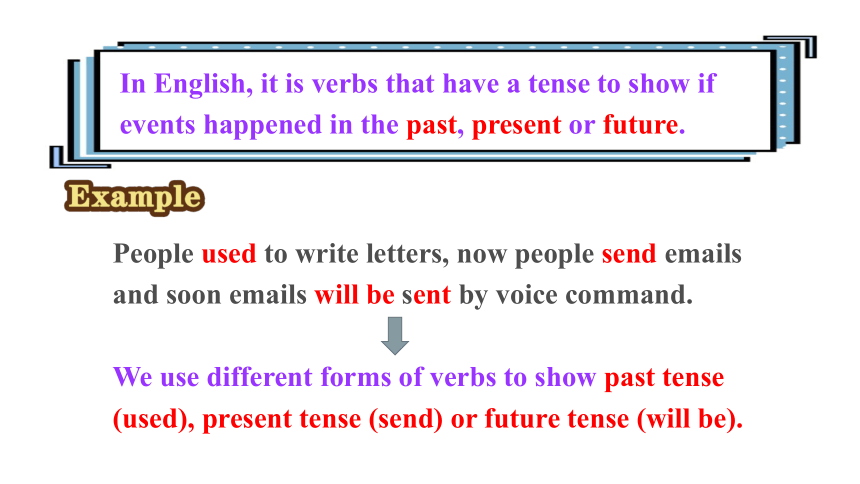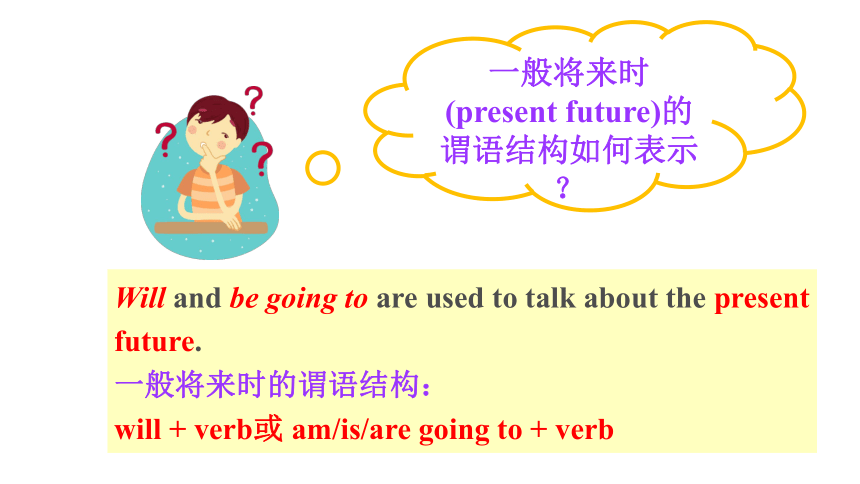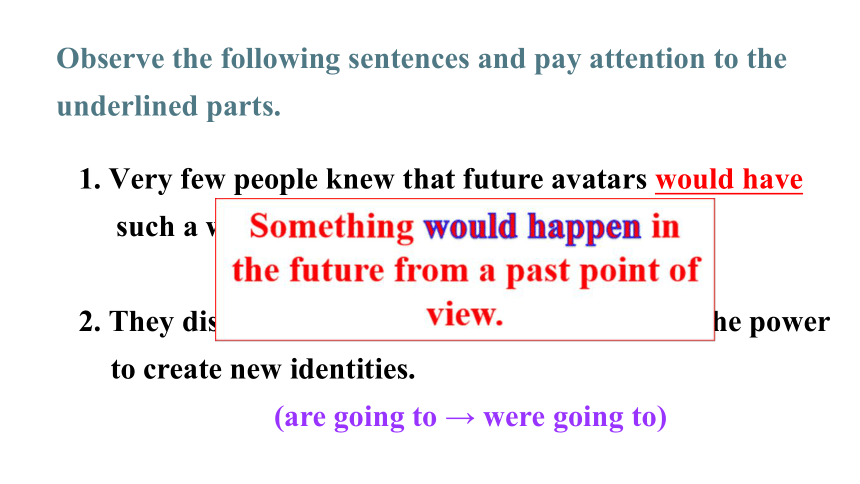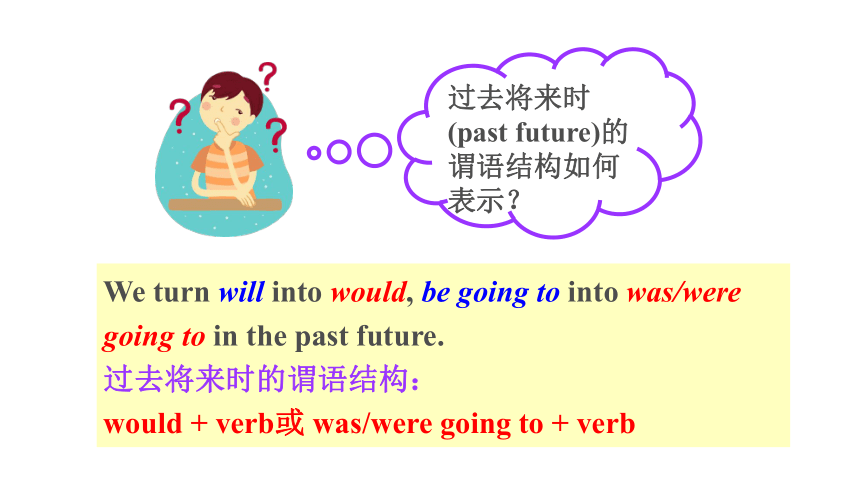2023届高三英语二轮复习过去将来时课件-(10张ppt)
文档属性
| 名称 | 2023届高三英语二轮复习过去将来时课件-(10张ppt) |  | |
| 格式 | pptx | ||
| 文件大小 | 450.5KB | ||
| 资源类型 | 教案 | ||
| 版本资源 | 通用版 | ||
| 科目 | 英语 | ||
| 更新时间 | 2023-02-14 14:29:41 | ||
图片预览





文档简介
(共10张PPT)
Grammar
Past Future
People used to write letters, now people send emails and soon emails will be sent by voice command.
We use different forms of verbs to show past tense (used), present tense (send) or future tense (will be).
In English, it is verbs that have a tense to show if events happened in the past, present or future.
一般将来时(present future)的谓语结构如何表示?
Will and be going to are used to talk about the present future.
一般将来时的谓语结构:
will + verb或 am/is/are going to + verb
1. Very few people knew that future avatars would have such a wide variety of forms and uses.
(will → would)
2. They discovered that they were going to have the power to create new identities.
(are going to → were going to)
Past future tense
Observe the following sentences and pay attention to the underlined parts.
过去将来时(past future)的谓语结构如何表示?
We turn will into would, be going to into was/were going to in the past future.
过去将来时的谓语结构:
would + verb或 was/were going to + verb
Past Future 过去将来时
We use the past future to talk about what will happen in the future from the point of some time in the past.
过去将来时表示从过去某时看将来要发生的事情。
一般会有一个发生在过去的动作,而过去将来时的动作要以此过去动作为参照点,在这个动作之后,将要发生的动作即可用过去将来时。
(2019江苏卷) By the day of the show, more than 300 people had said they would attend.
(2018浙江卷) He said that if he quit the job, he would lose his drive(动力) to work and succeed.
(1)主语+be(was或were)going to+动词原形+其他
(2)主语+would+动词原形+其他
(3)主语+was/were+动词不定式+其他
(4)主语+was/were about to+动词原形+其他
肯定句
否定句
(1)主语+be not (wasn't或weren't) going to+动词原形+其他
(2)主语+would not+动词原形+其他
一般疑问句
(1)Be(Was或Were)+主语+going to+动词原形+其他?
(2)Would+主语+动词原形+其他?
被动语态
(1)would+be+动词的过去分词(done)
(2)was/were+going to be+动词的过去分词(done)
构成
用法
1. “would +动词原形”表示从过去观点看将要发生的事。
e.g. My pen friend James said he would visit me in July.
I told my uncle that I would / should see him the next Sunday.
2. “was / were going to +动词原形”或“was / were to +动词原形”可表示过去打算、准备做的事,也可以表示过去按计划或安排即将发生的事。
e.g. Last night I was going to take a bath, but the light suddenly went out.
They were to succeed because they worked so hard.
was/were to do 可表示“注定要发生.....”
用法
3. “was / were about to +动词原形”表示过去某时正要、就要、即将做某事(该句型不与具体时间连用)。
e.g. I was about to go out when Jerry arrived.
4. come, go, leave, arrive, start等严格按照时间表发生的表起止的动词可用过去进行时“was/were doing …” 代替过去将来时。
e.g. Henry was leaving for New York two hours later.
5. 条件状语从句和时间状语从句中须用一般过去时代替过去将来时。
I didn't know when she would come, but when she came I would let you know.
固定句型“was/were about to do ...when ...”:正打算做……这/那时……
Two years ago, my mom told me that she 1._______________________ (send) me to a private high school. I was so excited because I 2._________ (start) a new chapter of my life.But the first two weeks at the new school was the most difficult time of my entire life. I was so homesick and I 3.__________ (not know) how to cheer myself up.To take my attention away from my sadness, I 4.______ (throw) myself into my studies. I wanted to keep every part of my day busy and occupied so I 5.____________ (not think) about how lonely I felt.Gradually, I 6._______ (start) to adapt myself to my new life.I just remember one afternoon, as I was about 7.________ (leave) the classroom after school, my head teacher walked to me and said that all my hard work 8.__________ (pay) off soon.Now I 9._____ (be) in my dream university.So if you put your effort into something, the result 10.________________ (not disappoint) you.
would send/was going to send
would start
didn’t know
threw
wouldn’t think
started
to leave
would pay
am
wouldn’t disappoint
Grammar
Past Future
People used to write letters, now people send emails and soon emails will be sent by voice command.
We use different forms of verbs to show past tense (used), present tense (send) or future tense (will be).
In English, it is verbs that have a tense to show if events happened in the past, present or future.
一般将来时(present future)的谓语结构如何表示?
Will and be going to are used to talk about the present future.
一般将来时的谓语结构:
will + verb或 am/is/are going to + verb
1. Very few people knew that future avatars would have such a wide variety of forms and uses.
(will → would)
2. They discovered that they were going to have the power to create new identities.
(are going to → were going to)
Past future tense
Observe the following sentences and pay attention to the underlined parts.
过去将来时(past future)的谓语结构如何表示?
We turn will into would, be going to into was/were going to in the past future.
过去将来时的谓语结构:
would + verb或 was/were going to + verb
Past Future 过去将来时
We use the past future to talk about what will happen in the future from the point of some time in the past.
过去将来时表示从过去某时看将来要发生的事情。
一般会有一个发生在过去的动作,而过去将来时的动作要以此过去动作为参照点,在这个动作之后,将要发生的动作即可用过去将来时。
(2019江苏卷) By the day of the show, more than 300 people had said they would attend.
(2018浙江卷) He said that if he quit the job, he would lose his drive(动力) to work and succeed.
(1)主语+be(was或were)going to+动词原形+其他
(2)主语+would+动词原形+其他
(3)主语+was/were+动词不定式+其他
(4)主语+was/were about to+动词原形+其他
肯定句
否定句
(1)主语+be not (wasn't或weren't) going to+动词原形+其他
(2)主语+would not+动词原形+其他
一般疑问句
(1)Be(Was或Were)+主语+going to+动词原形+其他?
(2)Would+主语+动词原形+其他?
被动语态
(1)would+be+动词的过去分词(done)
(2)was/were+going to be+动词的过去分词(done)
构成
用法
1. “would +动词原形”表示从过去观点看将要发生的事。
e.g. My pen friend James said he would visit me in July.
I told my uncle that I would / should see him the next Sunday.
2. “was / were going to +动词原形”或“was / were to +动词原形”可表示过去打算、准备做的事,也可以表示过去按计划或安排即将发生的事。
e.g. Last night I was going to take a bath, but the light suddenly went out.
They were to succeed because they worked so hard.
was/were to do 可表示“注定要发生.....”
用法
3. “was / were about to +动词原形”表示过去某时正要、就要、即将做某事(该句型不与具体时间连用)。
e.g. I was about to go out when Jerry arrived.
4. come, go, leave, arrive, start等严格按照时间表发生的表起止的动词可用过去进行时“was/were doing …” 代替过去将来时。
e.g. Henry was leaving for New York two hours later.
5. 条件状语从句和时间状语从句中须用一般过去时代替过去将来时。
I didn't know when she would come, but when she came I would let you know.
固定句型“was/were about to do ...when ...”:正打算做……这/那时……
Two years ago, my mom told me that she 1._______________________ (send) me to a private high school. I was so excited because I 2._________ (start) a new chapter of my life.But the first two weeks at the new school was the most difficult time of my entire life. I was so homesick and I 3.__________ (not know) how to cheer myself up.To take my attention away from my sadness, I 4.______ (throw) myself into my studies. I wanted to keep every part of my day busy and occupied so I 5.____________ (not think) about how lonely I felt.Gradually, I 6._______ (start) to adapt myself to my new life.I just remember one afternoon, as I was about 7.________ (leave) the classroom after school, my head teacher walked to me and said that all my hard work 8.__________ (pay) off soon.Now I 9._____ (be) in my dream university.So if you put your effort into something, the result 10.________________ (not disappoint) you.
would send/was going to send
would start
didn’t know
threw
wouldn’t think
started
to leave
would pay
am
wouldn’t disappoint
